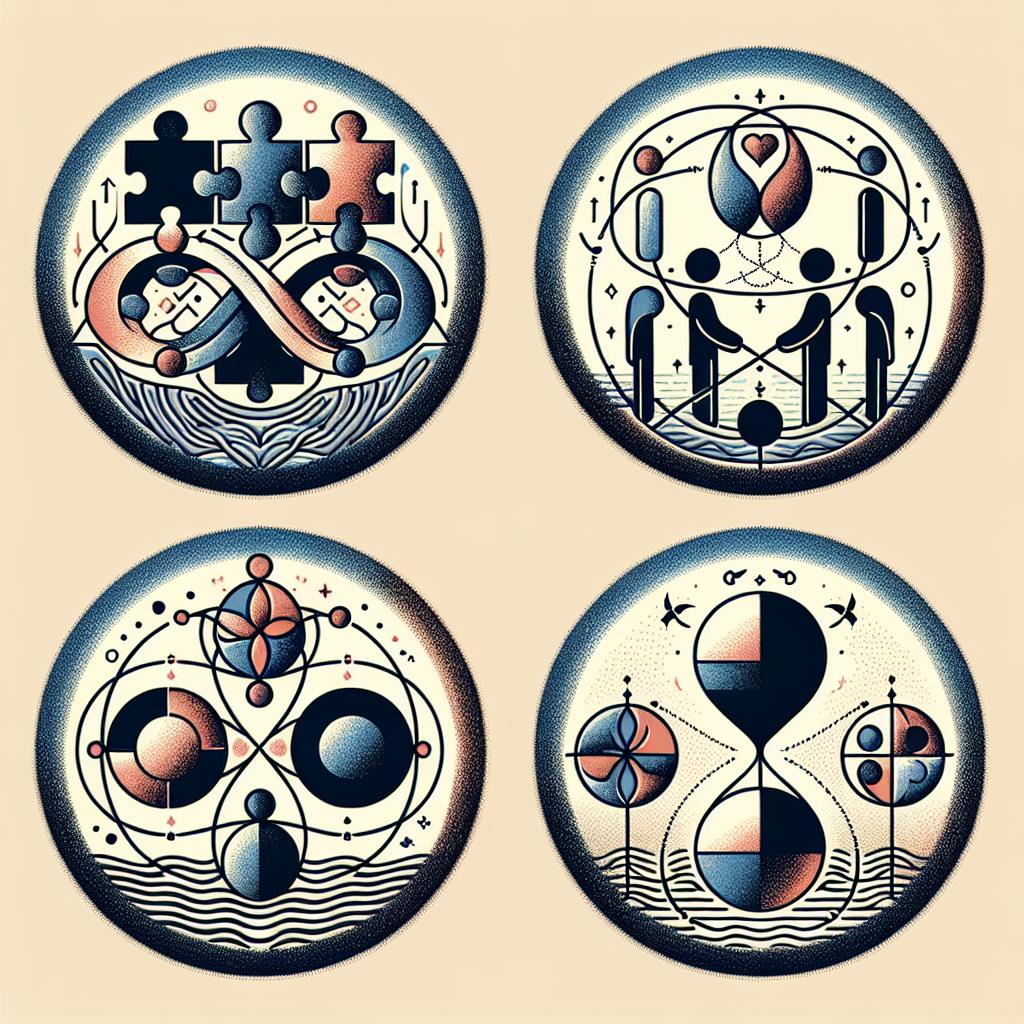In this article, you will discover the 4 main types of relationships that exist in our lives. Whether it’s with family, friends, romantic partners, or colleagues, understanding these dynamics can greatly enhance your connection with others. From platonic friendships to passionate romances, each relationship type brings its own unique set of joys and challenges. So, let’s explore and learn how to navigate these meaningful connections with grace and understanding.

Romantic Relationships
Definition of Romantic Relationships
Romantic relationships are intimate connections between two individuals that involve emotional and physical attraction. These relationships are characterized by love, affection, and a deep emotional bond. In romantic relationships, individuals often seek companionship, support, and a sense of belonging. These connections can vary in intensity and duration, ranging from casual dating to long-term partnerships.
Characteristics of Romantic Relationships
Romantic relationships possess several key characteristics that differentiate them from other types of relationships. Firstly, they are based on mutual attraction and a romantic connection. Both partners experience a strong emotional bond and desire for each other. Secondly, romantic relationships involve a high level of intimacy and vulnerability. Partners share their deepest thoughts, feelings, and desires, establishing trust and emotional closeness. Additionally, there is a significant level of commitment and exclusivity in romantic relationships, with partners often seeking monogamy and long-term stability.
Common Issues in Romantic Relationships
Despite the many joys that come with romantic relationships, they are not without challenges. Communication problems often arise, leading to misunderstandings and conflicts. Trust issues can also emerge, causing insecurities and doubts within the relationship. Differences in values, goals, or lifestyles may present obstacles that partners need to navigate together. Additionally, external factors such as societal pressures and stressors can strain the bond between partners. However, with open communication, compromise, and a willingness to work through issues, many couples successfully navigate these challenges and grow stronger together.
Friendships
Definition of Friendships
Friendships are voluntary relationships that are based on mutual trust, affection, and shared interests. They are built on a foundation of companionship and support, where individuals enjoy spending time together and rely on each other for emotional and social needs. Friendships are characterized by a sense of equality, where both parties contribute to the relationship’s growth and well-being.
Types of Friendships
There are various types of friendships that individuals can develop throughout their lives. Close friendships, often referred to as best friends or intimate friends, involve a deep level of emotional connection and trust. These friends are typically reliable, understanding, and provide strong support. Acquaintances, on the other hand, are friendships that are more casual and based on shared interests or activities. While they may not be as emotionally intimate as close friends, acquaintances still play an important role in social circles. Online friendships have also become increasingly common, where individuals connect and form relationships through social media platforms, forums, or online communities.
Importance of Friendships
Friendships are vital for personal well-being and happiness. Friends provide emotional support, empathy, and a sense of belonging. They are there to celebrate successes, offer a listening ear during challenges, and provide valuable advice. Friendships also promote personal growth, as they expose individuals to different perspectives and experiences. Additionally, friends contribute to a healthy social life, creating opportunities for socializing, engaging in activities, and forming lasting memories. Studies have shown that strong and healthy friendships can positively impact mental health, reduce stress, and enhance overall life satisfaction.

Family Relationships
Definition of Family Relationships
Family relationships refer to the connections between individuals who are biologically or legally related. These relationships can be between parents and children, siblings, or extended family members such as grandparents, aunts, and uncles. Family relationships are often seen as the most fundamental and enduring connections in a person’s life, providing a sense of identity, belonging, and support.
Types of Family Relationships
There are different types of family relationships that individuals may have. Parent-child relationships are crucial for a child’s development, where parents provide love, guidance, and support. Sibling relationships are formed between brothers and sisters, shaping important aspects of one’s social and emotional development. Extended family relationships involve connections with grandparents, aunts, uncles, and cousins, providing a broader support system and familial bonds.
Importance of Family Relationships
Family relationships play a central role in shaping an individual’s life. They provide a sense of belonging and identity, helping individuals understand their roots and cultural heritage. Family relationships also offer emotional support during challenging times, as well as encouragement to pursue personal goals and achievements. These connections foster a strong support system, where family members can rely on one another during both ups and downs. Additionally, family relationships provide a sense of stability and continuity, creating lasting memories and traditions that can be passed down through generations.

Professional Relationships
Definition of Professional Relationships
Professional relationships are connections individuals form within the context of their work or career. These relationships are based on common professional interests, objectives, or roles and are often characterized by cooperation, collaboration, and mutual respect. Professional relationships can occur between colleagues, supervisors and subordinates, clients and service providers, or mentors and mentees.
Types of Professional Relationships
There are several types of professional relationships that individuals may encounter in their careers. Colleague relationships involve peers who work together within the same organization or field. Collaboration, support, and teamwork are essential in building effective colleague relationships. Supervisor-subordinate relationships occur between individuals in different hierarchical positions, with the supervisor providing guidance, feedback, and support to the subordinate. Professional relationships with clients or customers are crucial for business success, focusing on providing quality service, understanding client needs, and maintaining client satisfaction. Mentor-mentee relationships involve a more experienced individual guiding and supporting a less experienced individual in their professional development.
Importance of Professional Relationships
Professional relationships are integral to career success and personal growth. They foster a positive work environment, encouraging teamwork, creativity, and innovation. Collaboration and effective communication within professional relationships lead to improved productivity and efficiency. Professional relationships also offer opportunities for learning and professional development, as individuals can benefit from the knowledge and experience of others. Building a strong professional network through these relationships can open doors for new opportunities, job prospects, and career advancement. Furthermore, supportive professional relationships contribute to job satisfaction, overall well-being, and a sense of belonging within the workplace.
In conclusion, relationships are a fundamental aspect of human life, shaping our experiences, happiness, and personal growth. Romantic relationships offer love, intimacy, and support, while friendships provide companionship, emotional support, and shared experiences. Family relationships form the foundation of our sense of identity, belonging, and support. Professional relationships contribute to career success, personal development, and a positive work environment. Nurturing these relationships with care, understanding, and open communication is essential for maintaining healthy and fulfilling connections that enrich our lives.


